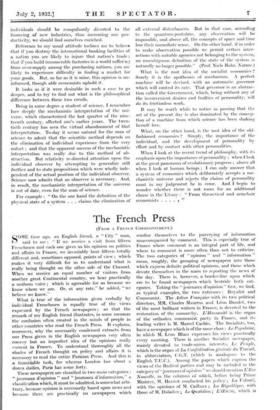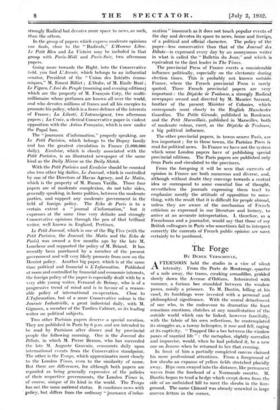The French Press
(FROM A FRENCH CORRESPONDENT.)
SOME time ago, an English friend, a " City " man, said to me : " If we receive a visit from fifteen Frenchmen and each one gives us his opinion on politics and affairs in France, we invariably hear fifteen totally different and, sometimes opposed, points of view ; which makes it very difficult for us to understand what is really being thought on the other side of the Channel. When we receive an equal number of visitors from another great Continental country, we hear practically a uniform voice ; which is agreeable for us because we know where we are. Or, at any rate," he added, "we believe we know."
What is true of the information given verbally by individual Frenchmen is equally true of the views expressed by . the French newspapers ; so that the remark of my English friend illustrates, in some measure the confusion often created in the minds of people in other countries who read the French Press. It explains, moreover, why the necessarily condensed extracts from our Press given in the English newspapers very often convey but an imperfect idea of the opinions really current in France. To understand thoroughly all the shades of French thought on policy and affairs it is necessary to read the entire Parisian Press. And this is a formidable task, for whereas London has about a dozen dailies, Paris has some forty.
These newspapers are classified in two main categories : " journaux d'opinion " and " journaux d'information," a classification which, it must be admitted, is somewhat arbi- trary, because. opinion is necessarily based upon news and because there are practically no newspapers which confine themselves to the purveying of information unaccompanied by comment. This is especially true of France where comment is an integral part of life, and where to comment is more often than not to criticize. The two categories of " opinion " and " information" mean, roughly, the grouping of newspapers into those which express definite political opinions, and those which devote themselves in the main to reporting the news of the day. There is, however, a border-line upon which are to be found newspapers which bestride both cat- egories. Taking the " journaux d'opinion " first, we find, as typical examples, the two extremes : Royalist and Communist. The Action Francaise with its two political directors, MM. Charles Maurras and Leon Daudet, two of the most brilliant writers in France, is devoted to the restoration of the monarchy. L'Huntanite is the organ of the orthodox communist party in France, and its leading writer is M. Marcel Cachin. The Socialists, too, have a newspaper which is of the same class : Le Populaire, in which M. Leon Blum expresses his views practically every morning. There is another Socialist newspaper, mainly devoted to trade-union interests, Lc Peuple, which is the organ of La Confederation generale du Travail, in abbreviation, C.G.T. (which is analogous to the English T.U.C.). Among the papers which express the views of the Radical parties and may be included in the category of " journaux d'opinion "we should mention L'Ere Nouvelle, in the columns of which, before being Prime Minister, M, Herriot conducted his policy ; La V ()Joule, with the opinions of M. Caillaux ; La Republique, with those of M. Daladier ; Le quotidien ; L'auvre, which is strongly Radical but devotes more space to news, as such, than the others.
In the group of papers which express moderate opinions one finds, close to the "Radicals," L'Homme Libre. Le Petit Bleu and La Victoire may be included in that group with Paris-Midi and Paris-Soir, two afternoon papers.
Going more towards the Right, into the Conservative field, you find L' Avenir, which belongs to an influential senator, President of the "Union des Interets econo miques," M. Ernest Billet ; L'Ordre, of M. Emile Bure ; Le Figaro, l'Ami du Peuple (morning and evening editions) which are the property of M. Francois Coty, the multi- millionaire whose perfumes are known all over the world, and who devotes millions of francs and all his energies- to promote his policy, which is a fierce defence of the interests of France ; La Liberte, L'Intransigeant, two afternoon papers ; La Croix, a clerical Conservative paper in violent opposition with the Action Francaise, which is now under the Papal ban.
The " journaux d'information," properly speaking, are Le Petit Parisien, which belongs to the Dupuy family and has the greatest circulation in France (1,800,000 (laily). Excelsior, which is closely associated with the Petit Parisien, is an illustrated newspaper of the same kind as the Daily Mirror or the Daily Sketch.
With the Petit Parisien and Excelsior should be counted also two other big dailies, Le Journal, which is controlled by one of the Directors of Havas Agency, and Le Matin, which is the property of M. Bunau Varilla. Those four papers are of moderate complexion, do not take sides, generally speaking, in home politics, between the moderate parties, and support any moderate government in the field of foreign policy. The Echo de Paris is to a certain extent a "journal d'information," but it expresses at the same time very definite and strongly Conservative opinions through the pen of that brilliant writer, well known in England, Pertinax.
Le Petit Journal, which is one of the Big Five (with the Petit Parisien, the Journal, the Matin and the Echo de Paris) was owned a few months ago by the late M. Loucheur and supported the policy of M. Briand. It has recently been purchased by a member of the present government and will very likely promote from now on the Herriot policy. Another big paper, which is at the same time political and financial is L'Information. Published at noon and controlled by financial and economic interests, the foreign policy of the paper is especially dealt with by a very able young writer, Fernand de Brinoy, who is of a progressive trend of mind and is in favour of a reason- able policy of international co-operation. Close to L'Information, but of a more Conservative colour is the Journee Industrielle, a great industrial daily, with M. Gignoux, a member of the Tardieu Cabinet, as its leading writer on political subjects.
Two other Parisian papers deserve a special mention. They are published in Paris by 6 p.m. and are intended to be read by Parisians after dinner and by provincial people the following morning. One is the Journal des Debats, in which M. Pierre Bernus, who has succeeded the late M. Auguste Gauvain, comments daily upon international events from the Conservative standpoint. The other is the Temps, which approximates most closely to the London Times, even to the similarity of name. But there are differences, for although both papers are regarded as being generally expressive of the policies of their respective governments, the London Times is, of course, unique of its kind in the world. • The Temps has not the same national statits. It combines news with policy, but differs from the ordinary `-‘ journaux d'infor- mation " inasmuch as it does not touch popular events of the day and devotes its space to news, home and foreign, of a political and official character. The policy of the paper—less conservative than that of the Journal des , Debats—is expressed every day by an anonymous writer in what is called the "Bulletin du Jour," and which is equivalent to the first leader in The Times.
The provincial Press of France exerts a considerable influence politically, especially on the electorate during election times. This is probably not known outside France, where the French - provincial Press is rarely quoted. Three French provincial papers are very - important : the Depeche de Toulouse, a strongly Radical, newspaper owned and directed by M. Maurice Sarrant, brother of the present Minister of Colonies, which corresponds most closely to the English Manchester Guardian. The Petite Gironde, published in Bordeaux and the Petit Marseillais, published in Marseilles, both of moderate. colour, exert, as the Depeehe de Toulouse, a big political influence.
The other provincial papers, in towns nearer Paris,. are less important ; for in those towns, the Parisian Press is read for political news. In France we have not the system which some London papers have of publishing special provincial editions. The Paris papers are published only from Paris and circulated to the provinces.
From the foregoing it will be seen that currents of opinion in France are both numerous and diverse, and, although without doubt they converge towards a central idea or correspond to some essential line of thought, nevertheless the journals expressing them tend to emphasize mostly the attitude of opposition to some- thing, with the result that it is difficult for people abroad, unless they are aware of the mechanism of French criticism as expressed in our literature and history, to arrive at an accurate interpretation. I, therefore, as a Frenchman and journalist, would say that those of my• British colleagues in Paris who sometimes fail to interpret correctly the currents of French public opinion are most certainly to be pardoned.







































 Previous page
Previous page